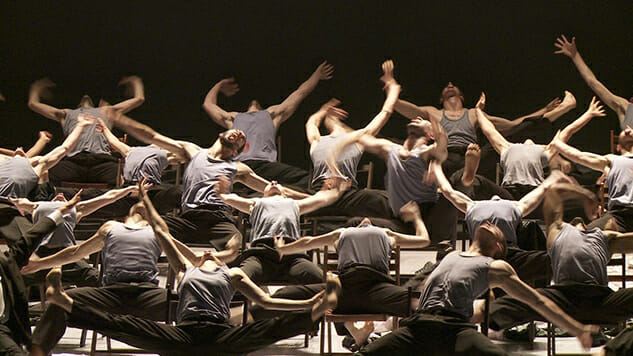Introducing Endless Mode: A New Games & Anime Site from Paste
Early on in Mr. Gaga, Ohad Naharin—the Israeli choreographer who is the subject of Tomer Heymann’s film—tells an anecdote about an autistic twin brother, supported by home-movie footage onscreen, that is meant to partly explain from where Naharin’s passion for dance came. Much later in the film, though, Naharin refers back to that story to reveal it was something he made up during a press conference in Australia. Heymann doesn’t really challenge him on whether it was fair to pass off such a tale as fact; Naharin’s justification is that sometimes one needs to create a fiction in order to understand something complex and elusive.
To some degree, this revelation speaks to Naharin’s own elusiveness—in Heymann’s film, at least, he comes off as a fairly aloof man who speaks about both his art and his personal life with the same po-faced detachment. It is also, however, the only instance of real subversion in Heymann’s film, which otherwise sticks to a conventional talking-heads aesthetic in trying to explore its subject, blending interviews with Naharin and some of his collaborators and admirers with public performance footage of his work and behind-the-scenes rehearsals. Not that all documentaries these days have to challenge aesthetic norms to be worth taking seriously (O.J.: Made in America doesn’t, but that at least has impressive depth, scope and sweep on its side)—but even as a straight-up informational documentary, Mr. Gaga falls short.
Wim Wenders’s Pina may have been less interested in exploring the life of the late, great choreographer Pina Bausch than in presenting some of Bausch’s works in as cinematic a manner as possible, but one could still manage at least a surface-level understanding of why Bausch remains so revered. More recently, Jody Lee Lipes’s Ballet 422 followed young choreographer Justin Peck as he tried to conceive and rehearse a new work for the New York City Ballet back in 2013. It articulated a refreshing view of artistic creation as less reliant on mysterious and intangible forces, and more a result of deep contemplation, empathetic collaboration and rigorous hard work.
Put Mr. Gaga next to those two striking nonfiction works, and Heymann’s film comes off as a failure by comparison. The promise of the film’s first 20 minutes—which juxtapose bits of Naharin’s life story with his dance works in ways that visually suggest how the choreographer’s experiences have influenced his art—gradually fades away as the film loses focus and blurs into a one-thing-after-another structure. It feels much more deadening than even the dullest fictionalized biopic. Occasionally, though, there are moments that might rouse a viewer’s interest: some of his Batsheva Dance Company dancers testifying to how much of a terror he can be to work with; Naharin discussing how he feels his mission as Batsheva artistic director is to unlock the potential of all of the dancers under him; his palpable sorrow as he recalls his last years with his beloved dancer wife/collaborator, Mari Kajiwara, before she succumbed to cancer in 2001.
When it comes to articulating what makes Naharin such a noteworthy choreographer—and thus, why Heymann felt a need to make this film—we may well come to the end of Mr. Gaga and still be left wondering. Most crucially, we never get a full sense of what “gaga” (the “movement language” Naharin pioneered, and which even gets a hearty endorsement from Natalie Portman in the film for its transformative qualities) actually is, so brief is the film’s explication of it. Apparently it has something to do with people becoming more aware of their bodies, opening up to our purely instinctual, animal sides, which Naharin at one point says is his general mission as an artist. It sounds like an appealing and fascinating philosophy, but how this necessarily feeds into Naharin’s work, and what specifically he’s interested in exploring through dance, remains frustratingly vague. Perhaps fans already keyed into Naharin’s genius will get more out of Mr. Gaga, but for everyone else, this saggy, aimless, superficial documentary won’t offer enough to enlighten you.
Director: Tomer Heymann
Writer: Tomer Heymann
Starring: Ohad Naharin, Tzofia Naharin, Avi Belleli, Naomi Blocj Fortis, Gina Buntz, Sonia D’Orleans Juste
Release Date: February 1, 2017
Kenji Fujishima is a freelance film critic, contributing to Slant Magazine, Brooklyn Magazine, The Playlist and The Village Voice. He is also Deputy Editor of Movie Mezzanine. When he’s not watching movies and writing and editing film criticism, he’s trying to absorb as much music, art, and literature as possible. He has not infrequently been called a “culture vulture” for that reason.
